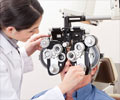Presence of Drugs used for eye treatment like ranibizumab and aflibercept in the breast milk of nursing mother’s may harm infant development.

‘If we can measure the levels of retinal treatment drugs such as Ranibizumab and aflibercept entering the infant's blood through breast milk, we can figure out the possible effect of exposure of these drugs on the infant over a long period of time.’





VEGF is present in breast milk and plays an important role in the development of an infant's digestive system. As a result, anti-VEGF drugs in a nursing mother raise concerns about possible adverse events in a developing infant if the drugs were to pass into breast milk and suppress VEGF. "As retina specialists, we often tell our pregnant or nursing patients that there's a risk of a small amount of these drugs making its way into the breast milk, but we can't be sure," said Dr. Rajeev Muni, co-lead author, a vitreoretinal surgeon at St. Michael's and a project investigator at the hospital's Li Ka Shing Knowledge Institute.
"We don't want these patients to lose their vision so we make a decision, despite limited information."
Hoping to change this, Dr. Muni and Dr. Verena Juncal, co-lead author and a retinal fellow at St. Michael's, measured the concentrations of retinal medications in the breast milk of three lactating patients following injection of anti-VEGF therapy. Each patient represented a different scenario - one continued to breastfeed while receiving therapy, one discontinued breastfeeding, and one never started.
The team found that the drugs were excreted into the breast milk within the first couple days following injection, with a corresponding reduction in VEGF levels.
Advertisement
"These results definitively show us that the drug reaches the breast milk," said Dr. Juncal. "We realize that some readers may question the small sample size, but if the drug reaches the breast milk in three patients, it'll reach in 30 patients because it's the same biological process."
Advertisement
"I'm comforted knowing that other pregnant or nursing mothers with retinal diseases will have the information needed to make an educated decision about whether to consider nursing while receiving these medications," said Lisa, one of the three study participants, who didn't want to reveal her surname.
Next, the researchers hope to collaborate with a team of paediatricians to find out whether the drug passes from the breast milk through the infant's digestive system and into the blood stream.
"If we can measure the levels of these drugs in the infant's blood, we can figure out the exposure over a long period of time," said Dr. Muni. "That's what's really important here - the possible effect of these drugs on the infant over a long period of time."
Source-Eurekalert















